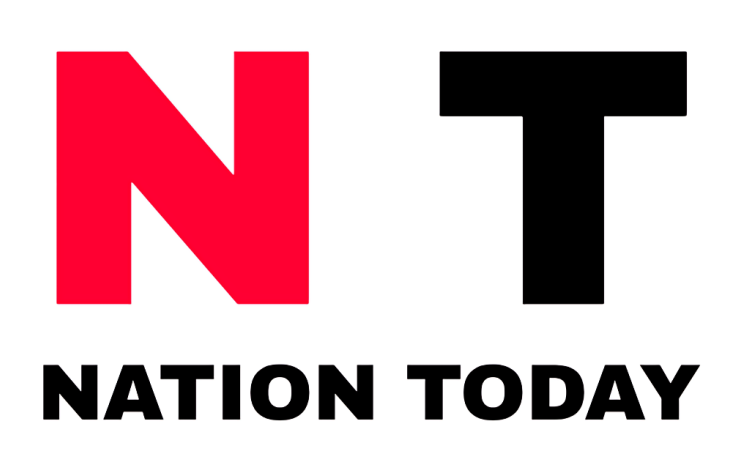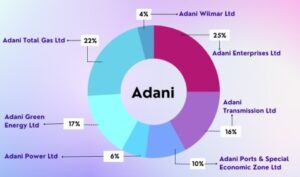The Adani Group, a sprawling Indian conglomerate founded in 1988 by visionary entrepreneur Gautam Adani, has transformed from its humble origins as a commodity trading business into a global powerhouse. This comprehensive business case delves into the Adani Group’s multifaceted business segments, its global reach, financial performance, strategic initiatives, recent controversies, and the road ahead.
Founded on July 20, 1988, the Adani Group started as Adani Exports Limited, a commodity trading company with a capital of ₹5 lakhs. Under the leadership of Gautam Adani, the group expanded its presence into various sectors, including port management, electric power, mining, renewable energy, airport operations, oil and gas, food processing, and infrastructure.
The Adani Group is headquartered in Ahmedabad, Gujarat, India, and serves a global clientele. Gautam Adani, the founder, currently serves as the Chairman. The group’s services encompass a wide spectrum, reflecting its status as a conglomerate with significant interests in sea and airport management, electricity generation and transmission, mining, natural gas, food, and infrastructure.
Financial Performance :
In the fiscal year 2023, the Adani Group reported robust financials:
- Revenue: ₹2.625 lakh crore (US$33 billion)
- Net Income: ₹23,509 crore (US$2.9 billion)
- Workforce: Approximately 29,200+ employee
- Revenue and Net Income:
- The Adani Group reported a substantial increase in revenue, reaching ₹2.625 lakh crore (US$33 billion) in 2023. This figure signifies the scale and diversification of the conglomerate’s operations across various sectors, including ports, power, mining, renewable energy, and infrastructure.
- The net income of the Adani Group also experienced a notable increase, reaching ₹23,509 crore (US$2.9 billion) in 2023. This indicates the group’s efficiency in managing costs, optimizing operations, and realizing profits across its business segments.
- Diversification and Revenue Streams:
- The group’s revenue diversification is evident from its extensive portfolio spanning port management, electric power, mining, renewable energy, airport operations, oil and gas, food processing, and infrastructure services. Diversification across sectors contributes to risk mitigation and resilience in the face of industry-specific challenges.
- Coal-Related Revenue:
- More than 60 percent of the Adani Group’s revenue is derived from coal-related businesses. This reliance on coal has been a point of contention and scrutiny, especially considering environmental concerns and global trends shifting towards renewable energy sources. The group’s future strategies and investments may be influenced by the evolving energy landscape.
- Operational Highlights:
- The Adani Group’s operational highlights include becoming India’s largest private coal mining company after winning mine rights in Orissa in 2010. The acquisition of the Galilee Basin mine in Australia with significant coal reserves further strengthened the group’s position in the coal sector.
- Adani Power emerged as India’s largest private power producer in 2014, with a total installed capacity of 9,280 MW. Acquisitions such as Dhamra Port in 2014 and the power arm of Reliance Infrastructure in 2017 contributed to the group’s infrastructure and power portfolio.
- Renewable Energy Ventures:
- The Adani Group’s foray into renewable energy is notable, with Adani Green Energy emerging as a key player in the sector. Strategic initiatives, such as signing a joint venture with the Rajasthan Government to set up India’s largest solar park with a capacity of 10,000 MW, showcase the group’s commitment to sustainable and clean energy solutions.
- Acquisitions and Investments:
- The Adani Group’s aggressive acquisition strategy is evident from its purchases of Ambuja Cements and ACC for $10.5 billion in 2022, making it the second-largest cement maker in India. Additionally, investments from UAE-based conglomerate International Holding Company and TotalEnergies further reflect the group’s global ambitions.
- Debt and Credit Metrics:
- The Adani Group’s corporate debt totaled $30 billion in 2022, raising concerns about its leverage and credit metrics. CreditSights, a unit of Fitch Ratings, warned about the potential risks of overleveraging, highlighting the importance of prudent financial management and sustainable debt levels.
- Market Value Fluctuations:
- The Hindenburg Research report in 2023 triggered a significant decline in the market value of Adani Group companies, with bonds and shares experiencing a loss of over $104 billion. The impact on market value underscores the vulnerability of the conglomerate to external factors, including regulatory challenges and perception-related issues.
- Investor Confidence and Stakeholder Relations:
- The controversies and challenges faced by the Adani Group, especially those highlighted in the Hindenburg report, had implications for investor confidence. The group’s response, communication strategies, and corporate governance reforms were crucial in mitigating concerns and rebuilding trust among investors and stakeholders.
- Regulatory Investigations and Compliance:
- Regulatory investigations initiated in response to the Hindenburg report underscore the importance of regulatory compliance for the Adani Group. The outcomes of these investigations may influence the group’s financial standing, market reputation, and future growth prospects.
- Long-Term Strategic Planning:
- The financial performance of the Adani Group reflects the complex interplay of short-term challenges and long-term strategic planning. The group’s ability to navigate controversies, implement reforms, and adapt to evolving market dynamics will play a pivotal role in shaping its financial resilience and sustainability.
Adani Subsidiaries:
- Adani Enterprises:
- Business Focus: It is the flagship company of the Adani Group and operates as a holding company.
- Operations: Engaged in trading, power generation and transmission, gas distribution, and other business activities.
- Adani Ports & SEZ (Special Economic Zone):
- Business Focus: Primarily focused on port management and development.
- Operations: Manages and operates a network of ports in India, handling cargo such as coal, containers, and crude oil. Also involved in the development of special economic zones.
- Adani Green Energy:
- Business Focus: Specializes in renewable energy generation.
- Operations: Engaged in the development, operation, and maintenance of solar and wind power projects. Aims to contribute to India’s sustainable energy goals.
- Adani Power:
- Business Focus: Power generation and distribution.
- Operations: Operates thermal and solar power plants across India, contributing to the country’s energy infrastructure.
- Adani Energy Solutions:
- Business Focus: Provides solutions in the energy sector.
- Operations: Involved in various aspects of the energy value chain, including trading, distribution, and related services.
- Adani Total Gas:
- Business Focus: Deals in the distribution of natural gas.
- Operations: Engaged in city gas distribution, supplying natural gas to various sectors, including households, industries, and the transportation sector.
- Adani Defence and Aerospace:
- Business Focus: Focuses on the defense and aerospace sectors.
- Operations: Involved in manufacturing and supplying defense and aerospace equipment. Plays a role in contributing to India’s defense capabilities.
- Adani Wilmar:
- Business Focus: Primarily operates in the food processing industry.
- Operations: Engaged in the production of edible oils, pulses, and other food products. A joint venture with Wilmar International Limited.
- Ambuja Cements:
- Business Focus: Mainly operates in the cement industry.
- Operations: Engaged in the production and distribution of cement and related products. Acquired by the Adani Group in 2022.
- ACC (Associated Cement Companies):
- Business Focus: A leading player in the cement industry.
- Operations: Involved in the manufacture and distribution of cement and ready-mix concrete. Acquired by the Adani Group in 2022.
- NDTV (New Delhi Television Limited):
- Business Focus: Media and broadcasting.
- Operations: A leading news and entertainment television network. Acquired by the Adani Group.
- North Queensland Export Terminal:
- Business Focus: Port and terminal operations.
- Operations: Located in Australia, it is involved in the export of coal and other bulk products.
Controversies and Challenges:
Hindenburg Research Report:
In recent times, the Adani Group faced allegations and investigations triggered by a report from Hindenburg Research. The report, released in [specific date], accused the group of engaging in unethical practices, including cronyism, leverage concerns, stock market rigging, tax evasion, and stock manipulation. The Hindenburg report led to a substantial decline in the Adani Group’s market value, triggering regulatory scrutiny and investor concerns.
- Regulatory Scrutiny: Following the Hindenburg report, regulatory bodies initiated investigations into the allegations. Market regulators and financial authorities probed into the claims of irregularities and corporate governance lapses. The Adani Group responded by committing to transparent disclosures and cooperation with regulatory inquiries to address concerns and restore market confidence.
- Stock Market Impact: The release of the Hindenburg report had an immediate impact on the Adani Group’s stock prices. The market value of Adani Group companies experienced a sharp decline, leading to increased volatility and concerns among investors. The group’s response to these challenges involved comprehensive disclosures, communication strategies, and efforts to address the issues raised in the report.
- Corporate Governance Reforms: In the wake of the Hindenburg report and subsequent regulatory investigations, the Adani Group initiated corporate governance reforms. These reforms aimed to strengthen internal controls, enhance transparency, and ensure adherence to regulatory norms. The group’s commitment to corporate governance became a focal point in its efforts to rebuild investor trust and mitigate the impact of the controversies.
- Long-Term Implications: The Hindenburg report and the subsequent controversies raised questions about the Adani Group’s long-term sustainability and reputation. Investors, analysts, and the general public closely monitored the developments, looking for signals of the group’s ability to address challenges, implement reforms, and navigate the complex landscape of global business and finance.
- Communication Strategy: The Adani Group, recognizing the significance of effective communication during a crisis, implemented a robust communication strategy. This involved transparent communication with stakeholders, addressing concerns, and outlining concrete steps taken to rectify issues highlighted in the Hindenburg report. The group’s communication efforts played a crucial role in shaping perceptions and restoring confidence.
- Stakeholder Engagement: Engaging with stakeholders, including investors, employees, regulatory authorities, and the wider public, became a priority for the Adani Group. The group proactively communicated its commitment to addressing concerns, implementing reforms, and maintaining a long-term focus on sustainable business practices.
- Impact on Expansion Plans: The controversies triggered by the Hindenburg report had potential implications for the Adani Group’s expansion plans, both within India and on the global stage. The group’s ability to secure funding, attract investment, and forge strategic partnerships became crucial factors in determining the trajectory of its future growth.

| Issue | Details |
|---|---|
| Hindenburg Report | Allegations of market manipulation and accounting fraud. Adani Group’s market value declined by over $104 billion. Supreme Court orders SEBI probe. Investigations by US authorities. |
| Cronyism | Accusations of close ties with Indian Prime Minister Narendra Modi and the BJP, leading to favorable government contracts. Denials from both Adani Group and Modi’s government. |
| Leverage | Corporate debt totaling $30 billion in 2022. CreditSights warns of potential risks, including a debt trap and default. |
| Stock Market Rigging | SEBI prohibition in 2007 due to involvement in a stock manipulation scheme. Later allowed to resume trading activities after paying a fine. |
| Tax Evasion | Arrest of Rajesh Adani in 2010 on charges of custom duty evasion. Allegations of diverting funds to overseas tax havens. |
| Corporate Governance | Concerns raised about dubious business relations and undisclosed payments to Adani contractors. Deloitte’s concerns about transparency. |
| Stock Manipulation Allegations | Hindenburg Research’s allegations of Adani engaging in stock manipulation and accounting malpractices. Adani’s denial and legal responses. |
The Adani Group’s response to the Hindenburg report controversy underscored the importance of resilience, adaptability, and strategic decision-making in navigating challenges inherent to a conglomerate operating in a globalized economy. The ultimate impact of these controversies on the group’s long-term trajectory remains a subject of ongoing observation and analysis.

Corporate Social Responsibility (CSR):
The Adani Group actively participates in Corporate Social Responsibility through the Adani Foundation:
Adani Foundation: The group’s CSR arm, the Adani Foundation, has been instrumental in implementing projects focused on education, healthcare, sustainable livelihood, and community development. Through initiatives like Project Udaan, Shiksha Ki Pathshala, and Unnati, the foundation aims to uplift communities and contribute to sustainable development.
The foundation’s initiatives extend to areas such as rural infrastructure development, renewable energy promotion, and disaster relief efforts. The Adani Group’s commitment to CSR reflects an understanding of its role in social development and environmental sustainability.
The Adani Group’s journey from a commodity trading business to a global conglomerate exemplifies resilience, adaptability, and strategic vision. Its expansion into diverse sectors, emphasis on renewable energy, and global presence contribute significantly to India’s economic landscape. Despite facing controversies and challenges, the group’s commitment to sustainable development and infrastructure underscores a strategic approach to future opportunities and obstacles.
For more such articles visit NationToday




